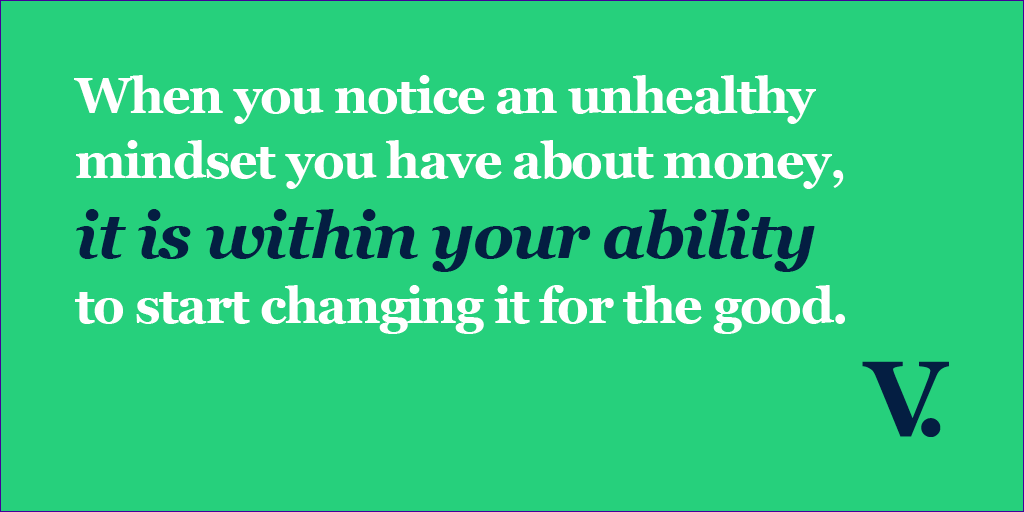3 Ways to Change Your Money Mindset for Success
There is a lot of talk about the need to have a healthy money mindset, but what exactly does that mean? How do you know what type of money mindset you have? As with anything, you must start by assessing your current views surrounding money.
What’s Your Story?
The first step is to figure out your personal money story. What are your attitudes and mindsets about all things money--saving, spending, debt, investment? What were your parents’ approaches to those same things? Did your parents talk about money a lot? Was money a cause of conflict? In your home growing up, was money plentiful or scarce? All of these factors play a role in dictating your own mindset about money as an adult, whether or not you have your own family yet.
Identify the money mindsets you may have automatically picked up or “inherited” from your family or origin. These can be positive or negative. If you notice some negative mindsets, do not fear. You can’t make a change without first recognizing your current situation. When you notice an unhealthy mindset you have about money, it is within your ability to start changing it for the good.

Abundance vs. Lack Mindset
You’ve probably heard the idea that you attract what you think, and to some extent this is true. It’s less of a mystical thing and more of a behavioral thing. If your mind is conditioned to think in a certain way about money, your actions will follow suit, so work on getting your mind right.
Create an abundance mindset for yourself. Abundance is not about having a lot as much as it is about gratitude and being positioned for growth. Even though we all have gifts and skills, we inevitably find ourselves in situations where we try and fail at something.
A growth mindset enables you to not let a failure break down your morale. It positions you to be letting your mental wheels spin to figure out how you can work with the talents and resources you have and cultivate them to even greater growth. This takes time, persistence, and a plan.
Beware of a mindset of lack, also known as a scarcity mindset. Inherently, this is a fear of never having enough. One way this can manifest is not purchasing things you need and can afford for the purpose of saving a few dollars. Just because you can do something for less money, doesn’t always mean it is a good investment once all things are considered.
For example, if you can figure out how to make your own soap but it takes you two hours, is the time and energy spent worth the couple of dollars you saved? Hardly. Work on learning how to make decisions that foster the right balance of time, energy, and money for you. It’s easy to notice areas of lack. Practice finding the areas of abundance in your life. Gratitude is always a good choice.
This abundance mindset will enable you to have a more positive outlook and to find new reasons and new areas in which you can grow. If you need additional support, talk with a financial adviser or a counselor who can help you stay on the right track with both your money and your mind.
Make a Plan for Your Financial Future
Once you identify your money mindset, it’s time to make a plan of how you are going to manage your money moving forward. Automate your bill payment and your saving as much as possible. When you don’t have to think about these things as much from month to month, you have more mental space to develop a vision for your financial future.
In order to make a plan, acknowledge both your strengths, “I’m great at saving for a goal,” and weaknesses, “I’m an impulse spender.”. Use them to craft a money management plan that will work for you. Try taking a more systematic approach to your money by setting up automatic transfers to savings and creating SMART goals (Specific, Measurable, Attainable, Relevant and Timely). An example of a SMART goal with your money would be to say: “I want to pay off an extra $2,400 of student loan debt this year,” and then paying an extra $200 off the principal balance each month over the course of one year via online payment or automatic deduction from your bank account.
Be realistic with your goals and take ownership of your weaknesses. If you’re an impulse spender, keep a journal of what you buy, when you bought it, and why you did. This will help you to understand your purchase habits. It’s not a guilt trip as much as it is an eye-opener.
Take about 30 minutes per week to check in with your money situation. Assess where you are at with your finances and see if there are any small adjustments you would like to make for the upcoming week. Remember that money is a tool. There is always room for improvement.
Have a Vision of Your Financial Goals
And finally, have a vision for your money future. Just like in a human relationship, your feelings surrounding money may change depending on the various factors at work, but stay on the path and keep your long term financial goals in mind.
It’s no surprise that money is a very emotional topic for most people. It’s all too easy to let emotions dictate your sense of worth and identity. Jealousy or comparison always try to sneak in, especially when you look at other people’s lives. When you know your “why” and are simply aware of your financial situation and mindsets, it’s easier to silence those difficult emotions. This is especially true when you are confident that you are making the decisions that you want to be with your money.
Achieving your financial goals and maintaining your commitment to said goals builds a solid financial foundation on both a technical and mental level. You’re getting your money right and your mind right--and that’s something worth committing to.
References
- Crary, Mindy. 15 Ways To Improve Your Relationship With Money. (2012, February 13). Retrieved from https://www.forbes.com/sites/moneywisewomen/2012/02/13/15-ways-to-improve-your-relationship-with-money/#49e0677542eb (accessed 2019, October 8).
- Eadie, Sarah. Adopt These 4 Money Mindsets and Save More. Retrieved from https://www.simple.com/blog/how-to-save-money-4-mindsets (accessed 2019, October 8).
- Vasel, Kathryn. How to have a better relationship with money. (2018, June 22). Retrieved from https://money.cnn.com/2018/06/22/pf/improve-your-relationship-with-money/index.html (accessed 2019, October 8).








